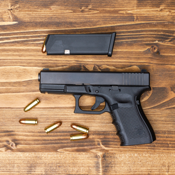
Tax Guide for Sellers of Firearm and Ammunition Products
How to Use This Guide
Each section of this guide contains important information about retail sales (for example, sales to consumers) of firearms, firearm precursor parts, or ammunition in California.
- The Getting Started section provides key resources related to registration, filing returns, making payments, account maintenance, and other important information.
- The Frequently Asked Questions (FAQs) section provides answers to common questions and issues.
- The Industry Topics section provides information on specific topics important to sellers of firearms and ammunition products.
- The Resources section provides links to helpful information about laws and regulations, publications, special notices, the exemption certificate for sales to peace officers and law enforcement agencies, and assistance from our customer service representatives.
The general information provided in this guide is not intended to replace any law or regulation. This guide summarizes the law and applicable regulations in effect when it was last updated. However, changes in the law or regulations may have occurred. If there is a conflict between this guide and the law, our decisions will be based on the law.
Overview
Helping your business succeed is important to us. The taxes or fees paid to the state help fund many important state and local services and programs.
This guide will help you better understand the California Firearm Excise Tax Law enacted by the Gun Violence Prevention and School Safety Act (Assembly Bill 28, Stats. 2023, ch. 231). It explains the obligations of firearms dealers, firearms manufacturers, and ammunition vendors making retail sales in California.
If you are a retailer who would like more information on how sales and use taxes apply to your business, see our Sales & Use Tax in California webpage.
How the Revenue Is Used
The revenues from the California Firearm, Firearm Precursor Part, and Ammunition Excise Tax (CFET), after state administrative costs, are used to fund various gun violence prevention, education, research, response, and investigation programs.
For detailed revenue information, see Revenue and Taxation Code (RTC) section 36005.
Assistance Available
If you need assistance with topics in this guide or other related questions, please contact us by email or by calling our Customer Service Center at 1-800-400-7115 (TTY:711) and selecting the option for Special Taxes and Fees. Customer service representatives are available Monday through Friday from 7:30 a.m. to 5:00 p.m. (Pacific time), except state holidays. Additional contact information and hours of operation are available on our How to Contact Us webpage.
If you have suggestions for improving this guide, please contact us by email.
